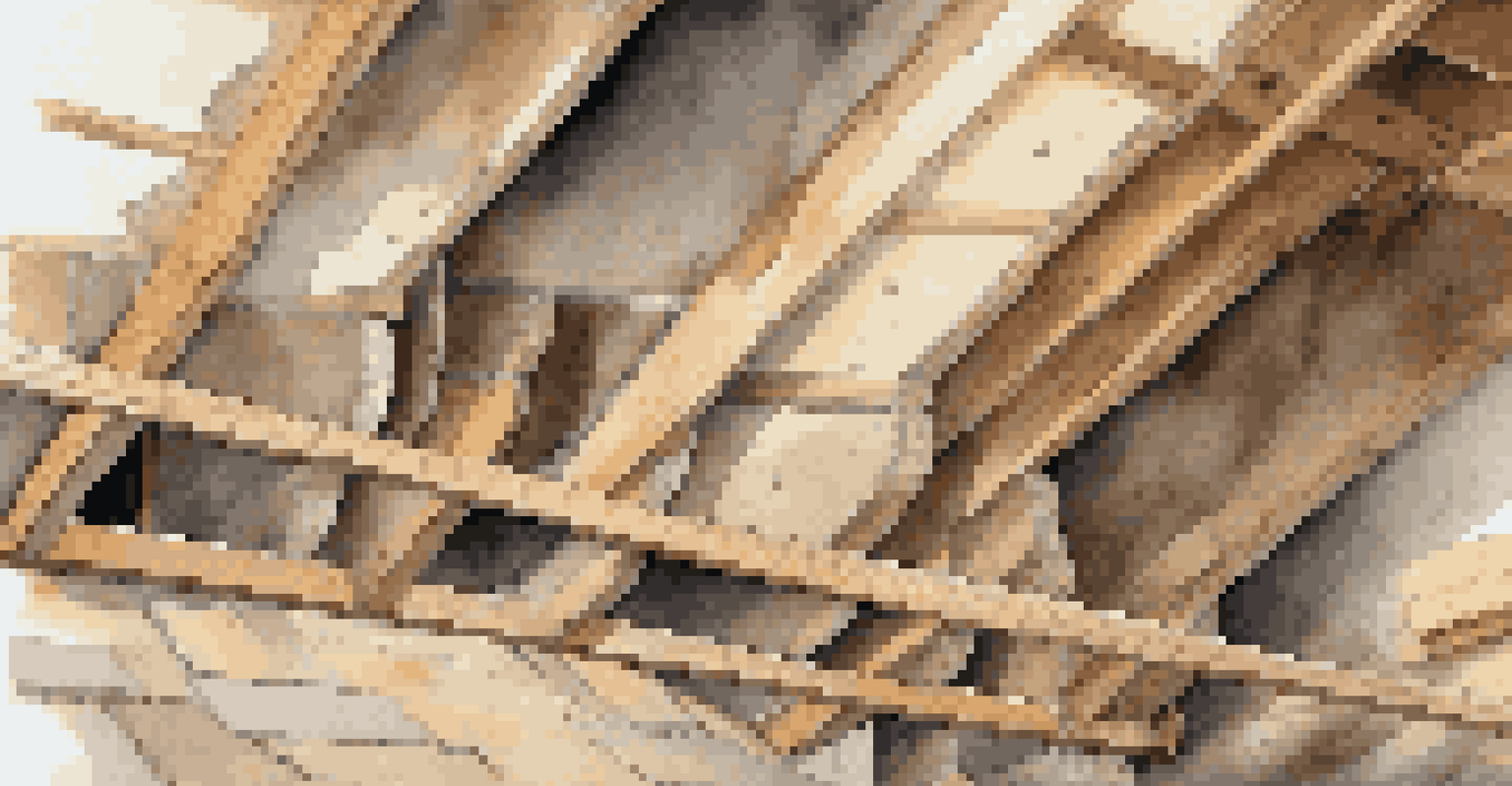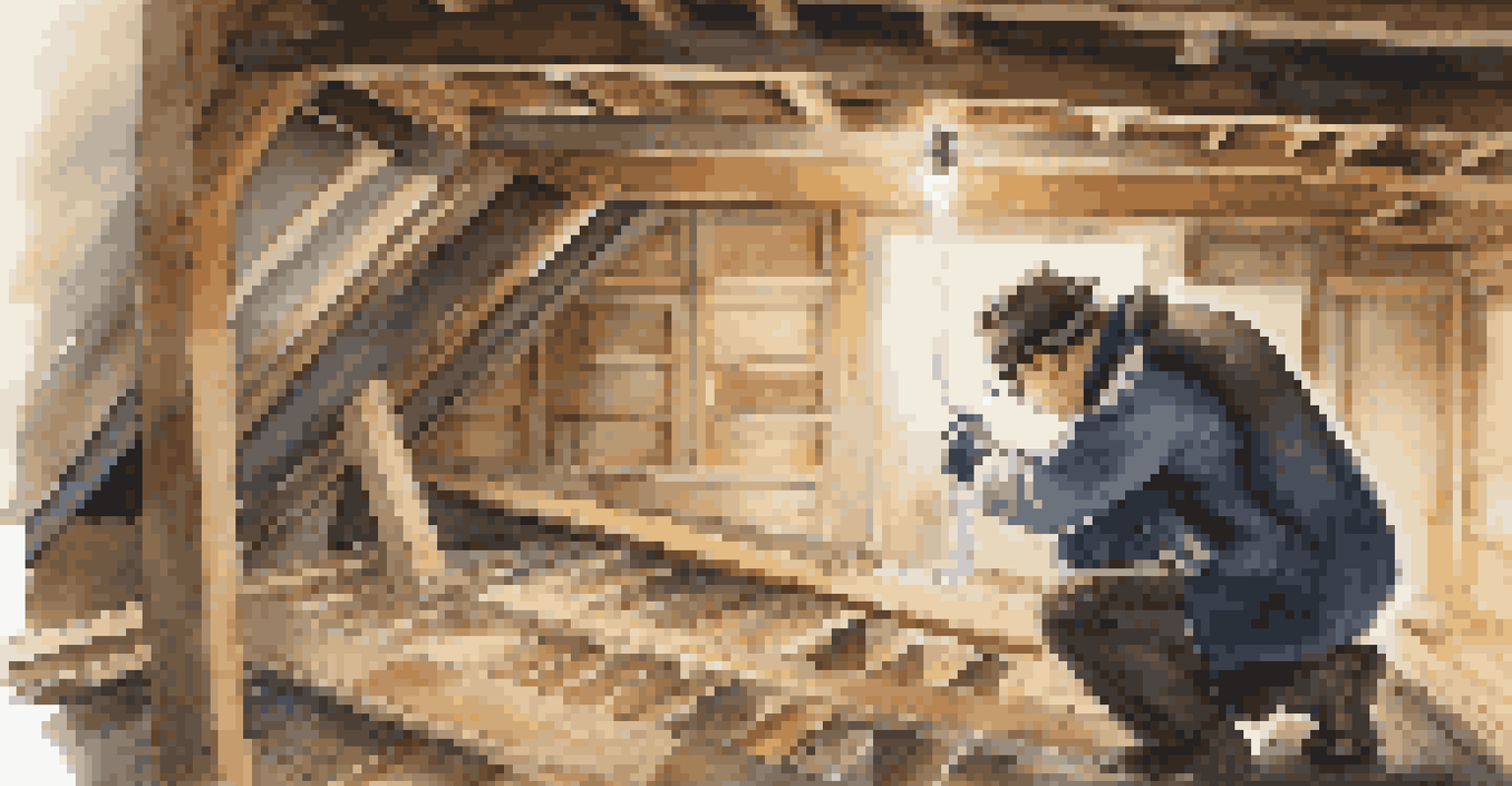What Home Inspectors Look for in Attics and Basements

Understanding the Importance of Attic Inspections
Attics are more than just a storage space; they play a crucial role in your home's overall health. Home inspectors often start their examination here to look for signs of moisture, insulation issues, and structural integrity. A well-maintained attic can prevent problems like mold growth and energy inefficiency, making it essential for homeowners to understand its significance.
An ounce of prevention is worth a pound of cure.
During an inspection, the inspector will check for proper ventilation, which helps regulate temperature and moisture levels. Poor ventilation can lead to condensation and can contribute to roof damage, which can be costly to repair. Ensuring your attic has adequate airflow can also prolong the life of your roof and keep your home comfortable year-round.
Additionally, inspectors will look for any signs of pests or wildlife that may have taken up residence. Rodents and insects can cause significant damage to insulation and wiring, leading to expensive repairs. By addressing these issues early, homeowners can protect their investment and maintain a safe living environment.
Key Signs of Moisture Damage in Attics
Moisture is a major red flag in any attic, and inspectors are trained to spot its telltale signs. Look for water stains on the ceiling or walls, which can indicate leaks from the roof or plumbing. Inspectors will also check insulation for dampness, as this can reduce its effectiveness and lead to higher energy bills.

Additionally, mold growth is another critical concern. It thrives in damp environments and can pose health risks to your family. Inspectors will carefully examine for any signs of mold, and if found, they'll recommend further testing and remediation to ensure your home remains safe.
Importance of Attic Inspections
Regular attic inspections are essential for identifying moisture, insulation, and structural issues that can affect your home's health.
Finally, the inspector will assess the roof structure itself. Any sagging or warping can indicate serious underlying issues that need immediate attention. Identifying these problems early can save homeowners a significant amount of money and stress in the long run.
Assessing Insulation Quality in Your Attic
Insulation plays a vital role in maintaining your home's energy efficiency. Home inspectors evaluate the type and thickness of insulation present in the attic to ensure it meets current standards. Inadequate insulation can lead to heat loss in winter and excessive heat in summer, resulting in higher utility bills.
The best way to predict the future is to create it.
Inspectors will also check for any gaps or compression in the insulation. Even small spaces can significantly reduce its effectiveness, making it crucial to have a continuous layer without interruptions. Homeowners should consider upgrading their insulation if it's found lacking during an inspection.
Moreover, the inspector will verify that insulation materials are free from contaminants. Items like dust, debris, or even animal droppings can compromise insulation performance. Keeping the attic clean and well-maintained ensures optimal energy efficiency and comfort.
Ventilation: A Critical Component of Attics
Proper ventilation is essential for any attic, as it helps control moisture and temperature. Home inspectors will look for vents, fans, and other systems that promote airflow. Without adequate ventilation, heat and humidity can build up, leading to potential roof damage and increased energy costs.
The inspector will assess whether the ventilation is balanced, meaning that intake and exhaust vents work together effectively. If there's too much intake or exhaust, it can lead to airflow problems that might affect your home’s comfort. Ensuring a balanced system is essential for maintaining an efficient attic.
Detecting Moisture Damage
Moisture damage in attics, such as water stains and mold growth, can lead to serious health risks and costly repairs if not addressed promptly.
Lastly, inspectors will check for any obstructions that might impede airflow, such as insulation blocking vents. Homeowners should ensure that their ventilation systems are clear and functioning correctly to protect their home from moisture-related issues.
Spotting Structural Issues in Attics
Structural integrity is paramount when it comes to attics, as any weaknesses can affect the entire home. Home inspectors will look for sagging beams, cracks, or other signs of distress. Identifying these issues early can prevent costly repairs down the line and ensure the safety of your family.
Inspectors also examine the connections between the rafters and walls to ensure they are secure. Weak or damaged connections can lead to further structural problems, and addressing them promptly can help maintain your home's stability. Homeowners should be proactive in addressing any structural concerns.
Additionally, inspectors will assess the condition of the roof sheathing and framing. Any signs of rot or insect damage can compromise the structure and require immediate attention. Regular inspections can help homeowners stay ahead of these issues and maintain a safe and sound living space.
Understanding Basement Inspection Essentials
Like attics, basements can reveal a lot about a home's condition. Home inspectors pay close attention to signs of moisture, structural issues, and insulation quality. A thorough inspection can help homeowners identify potential problems before they escalate, ensuring the basement remains a functional part of the home.
Inspectors will check for water intrusion signs, such as stains on walls or floors. These indicators can suggest that the property may have drainage issues or a failing waterproofing system. Addressing these issues early can prevent costly damage and ensure the basement remains dry and usable.
Ensuring Proper Ventilation
Proper ventilation in attics is crucial for regulating moisture and temperature, helping to prevent damage and improve energy efficiency.
Moreover, the inspector will assess the foundation walls for cracks or shifting. Structural issues can compromise the safety of the entire home, so identifying them during an inspection is crucial. Homeowners should consider regular basement inspections to maintain their property’s integrity and safety.
Checking for Mold and Air Quality in Basements
Mold is a common concern in basements due to their naturally damp environment. Home inspectors will carefully check for any signs of mold or mildew, which can affect indoor air quality. If mold is detected, it's essential for homeowners to take immediate action to remediate it and improve air quality.
Inspectors will also assess the source of moisture, which could be due to poor ventilation or water leaks. Fixing these underlying issues is vital in preventing mold growth and maintaining a healthy living space. Homeowners should consider using dehumidifiers to control moisture levels in the basement.

Additionally, the inspector may test the air quality to ensure it's safe for occupants. Poor air quality can lead to health issues, particularly for those with allergies or respiratory conditions. Maintaining good air quality is essential for overall wellness, making it a priority for homeowners.
Ensuring Proper Egress in Basements
Egress refers to the ability to exit a space safely in case of an emergency, and it's a crucial consideration in basement inspections. Inspectors evaluate whether there are proper exit routes, such as windows or doors that meet safety codes. Adequate egress can mean the difference between safety and danger in an emergency situation.
Home inspectors will check that windows are large enough and positioned correctly to serve as an escape route. If a basement is used as a living space, having safe egress is not just a recommendation but often a legal requirement. Homeowners should familiarize themselves with local building codes to ensure compliance.
Finally, the inspector will also assess any obstacles that might hinder egress, such as clutter or inadequate lighting. Clear, accessible exit routes are essential for safety and peace of mind. Homeowners should regularly evaluate their basements to ensure they remain safe and compliant.